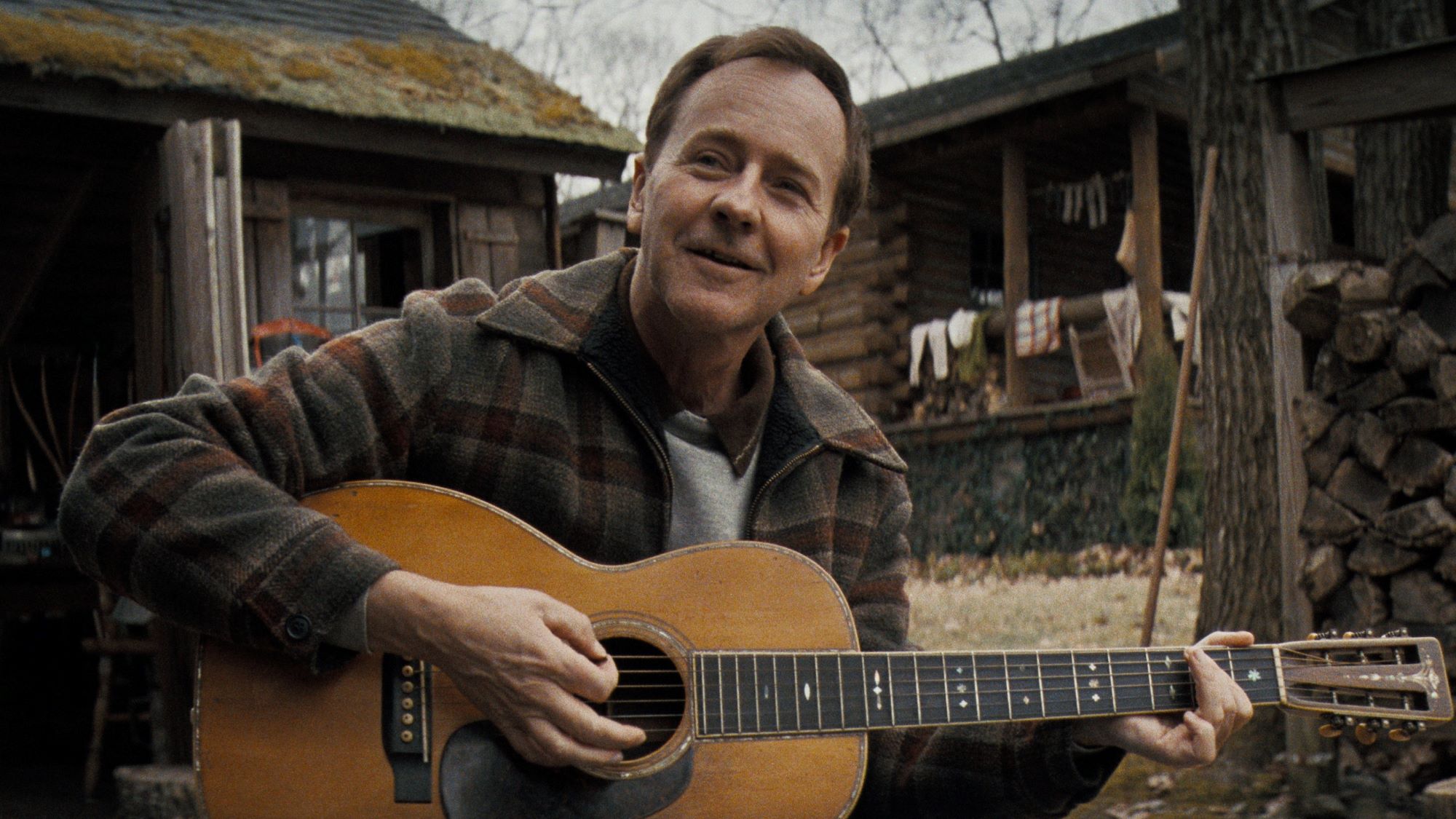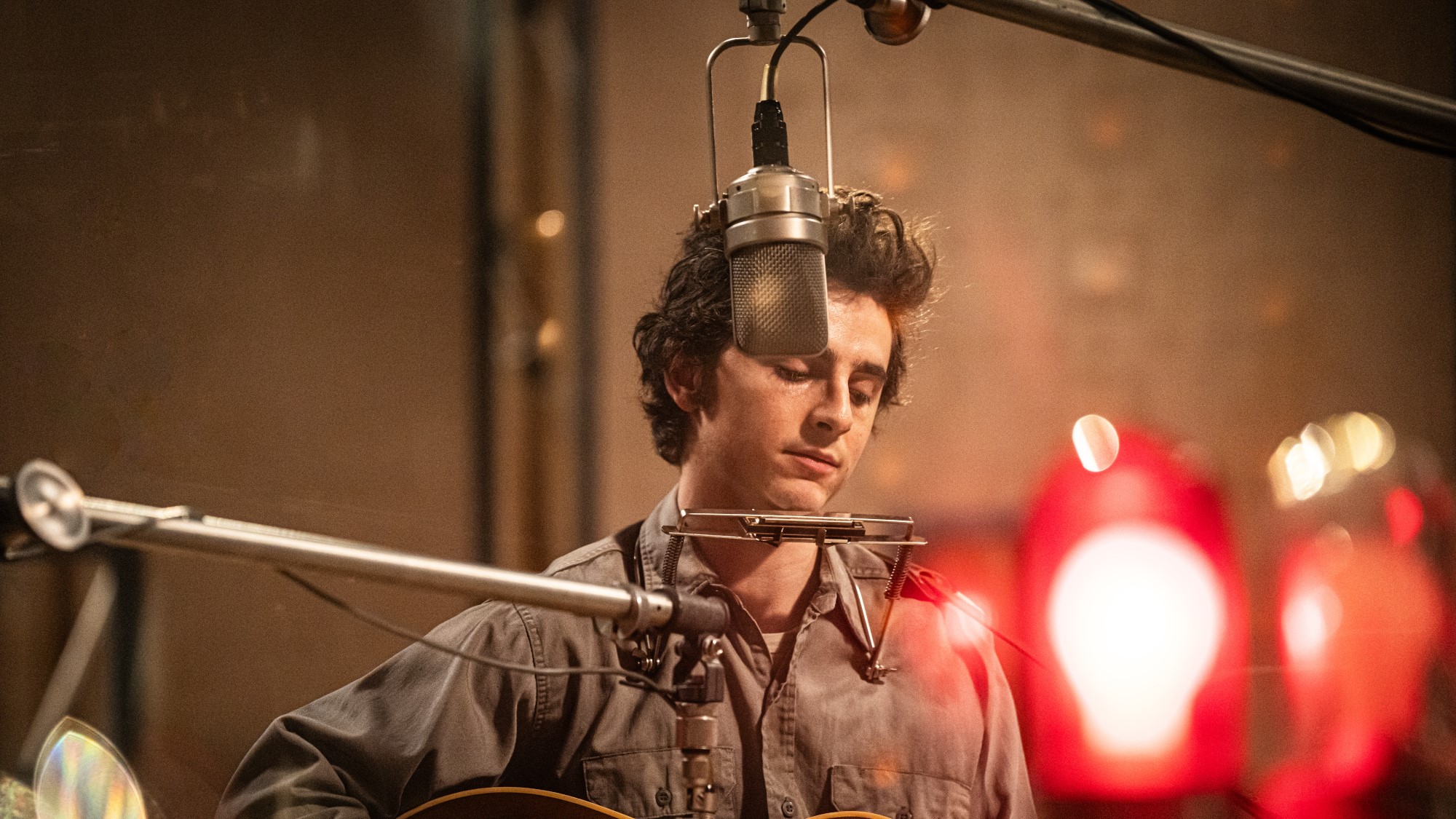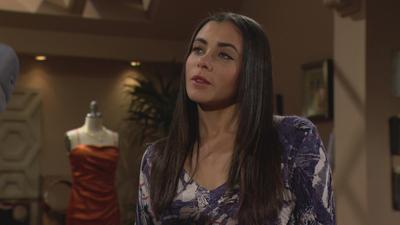What to Watch Verdict
Timothée Chalamet and James Mangold combine for a look into iconic musician Bob Dylan’s rise that rarely strikes a false chord.
Pros
- +
Chalamet gives an awards-worthy performance
- +
Mangold finds a great throughline and executes it incredibly well
- +
Supporting performances, particularly Edward Norton, are strong
Cons
- -
A few moments where it doesn’t trust itself/audience
James Mangold may not have created all the cliches that became associated with the music biopic genre in the mid 2000s, but as the director of Walk the Line he certainly helped solidify many of them. So much so that the way he told his story of Johnny Cash became the main crux of the parody Walk Hard. It would have been easy to assume then that a similar format would await A Complete Unknown, Mangold’s latest venture into the genre focused on Bob Dylan. But that’s not what we get. Instead, Mangold and his star Timothée Chalamet tell a story that tweaks the conventions of the music biopic to perfectly suit the iconic musician’s persona.
A Complete Unknown tracks Dylan’s rise from his arrival in New York City in 1961 to his transition to electric at the Newport Folk Festival in 1965. But the actual plot of the movie is rather light and any real exploration of Dylan’s backstory is nonexistent. Rather, the movie is more of a character study of Dylan and his shucking of the various forces that attempted to box him in.
Key to that is Chalamet. This is not simply an imitation, Chalamet embodies Dylan on the screen, making it look effortless and completely natural in the process. You don’t need a plot to drive the story, as Chalamet is the north star that pulls you in and guides you through. It's right up there with Call Me By Your Name as one of the best performances of Chalamet’s career to date; it will likely net him another Oscar nomination and could see him claim the prize for the first time.
Chalamet’s performance is so strong that it could have easily overshadowed the supporting cast, but his co-stars make the most of what they can. Dan Folger as Dylan’s manager Albert Grossman, Scoot McNairy as Woody Guthrie and Boyd Holbrook as Johnny Cash flow in and out of the movie but are usually memorable when they’re in it. Monica Barbaro as Joan Baez and Elle Fanning as Sylvie Russo (based on Dylan’s real-life girlfriend in the 1960s Suze Rotolo) present some of those boxes (the established, traditional folk singer not causing waves in Baez; normal relationship with Sylvie) but offer more to their performances than that.
For my money though, the standout supporting performance belongs to Edward Norton as Pete Seeger, the famous folk musician who discovers and mentors Dylan. I almost didn’t recognize Norton when I first saw him, as he carried himself so uniquely to play the soft-spoken and kindly Seeger (he initially reminded me of Mark Rylance). Norton is fantastic through and through, successfully getting across Seeger’s pride in Dylan and how he is helping to expand folk, as well as his conflict with Dylan as he becomes so big and challenges Seeger’s belief of what music should be.

Back to Mangold, I was very impressed with how he found the angle and style to tell this story and then executed it nearly flawlessly. As director and co-writer with Jay Cocks (adapted from Elijah Wald’s book "Dylan Goes Electric! Newport, Seeger, Dylan and the Night that Split the Sixties"), Mangold tells this story with a flow and tone that feels authentic to Dylan himself — understated, but incredibly rich; focused more on the meaning and feelings.
If you’re someone who enjoys a more straightforward plot that may not be as appealing to you. Things like Dylan’s rise from an unknown musician to one of the biggest in America are basically skipped over, while other moments that may have been mined for more drama (an instance where Dylan refuses to play his classics at a concert, challenging the norm) are shown but then never touched again. Everything is in service toward portraying Dylan’s individuality. Though sometimes the script does hit a bump with a moment that’s too on the nose; particularly an ending scene where the movie’s theme is overtly stated.
Mangold may not be an “auteur” by the traditional definition, as I have a hard time pinning down a specific style of his that makes his work immediately identifiable like a Scorsese or a Tarantino. However, he is incredibly adept at finding the right way of telling a story — be it 3:10 to Yuma, Logan, Ford v Ferrari or A Complete Unknown — and executing it beautifully.
That is the case with A Complete Unknown, which I think will work for those who adore Dylan but is still accessible for those not as familiar with his career.
A Complete Unknown releases exclusively in movie theaters on December 25 in the US. The movie premieres on January 17, 2025, in the UK.

Michael Balderston is What to Watch’s assistant managing editor and lead movie writer, covering movies coming to theaters, writing movie reviews and highlighting new and classic movies on streaming services; he also covers a range of TV shows, including those in the Taylor Sheridan universe, Slow Horses, Only Murders in the Building, Jeopardy!, Saturday Night Live and more, as well as the best ways to watch some major US sporting events.
Based outside of Washington, D.C., Michael's previous experience includes writing for Awards Circuit, TV Technology and The Wrap.
Michael’s favorite movie of all time is Casablanca, while his favorite TV show is Seinfeld. Some 2025 favorites include One of Them Days and Black Bag for movies, and The Pitt on TV. Follow on Letterboxd to keep up with what I'm watching.
You must confirm your public display name before commenting
Please logout and then login again, you will then be prompted to enter your display name.











